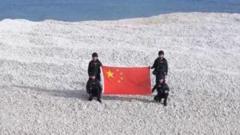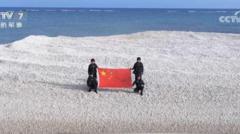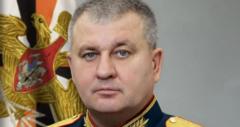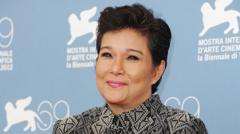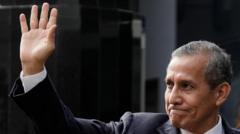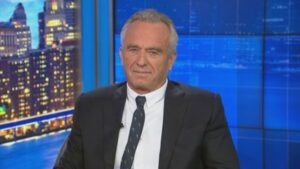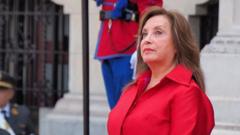The turmoil marks a significant moment in Philippine politics as factions within the government grapple for power and public support ahead of key elections.
**Impeachment Crisis in the Philippines: Vice President Sara Duterte Under Fire**
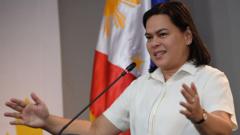
**Impeachment Crisis in the Philippines: Vice President Sara Duterte Under Fire**
Legislators in the Philippines move forward with impeachment against Vice President Sara Duterte amidst corruption allegations and escalating tensions with President Marcos.
The Philippine House of Representatives has initiated an impeachment process against Vice President Sara Duterte, igniting an intense political crisis. Allegations against Duterte include the misuse of public funds amounting to millions and a purported threat to assassinate President Ferdinand "Bongbong" Marcos Jr., claims she vehemently denies, asserting that these charges stem from political vendettas.
This unprecedented action, with 215 out of 306 lawmakers endorsing the impeachment, escalates the ongoing feud between Duterte and Marcos, both hailing from influential political families deeply entwined in the nation’s history. Duterte is the daughter of former President Rodrigo Duterte, while Marcos is the son of the notorious leader Ferdinand Marcos Sr., both figures synonymous with polarizing political legacies.
The impeachment bill proceeds to the Senate, where a 24-member court will deliberate on the case. If found guilty, Duterte would be removed from office, making history as the first vice president in the Philippines to undergo impeachment. The expected timeline leaves her in office until the Senate’s ruling, with no trial date currently set.
Duterte's potential removal could effectively eliminate her aspirations for higher office, particularly in light of Marcos's term limit barring re-election in 2028. The impending mid-term elections in May serve as a significant backdrop, presenting a litmus test of public opinion for both leaders and their respective policies.
Amidst these events, Vice President Duterte has refrained from public commentary, while her brother, Representative Paolo Duterte, accused the administration of political persecution, warning of the perilous implications of this maneuver. Although Marcos remains publicly silent on the impeachment proceedings, he previously remarked on the futility of pursuing such actions when more pressing matters exist.
Since the restoration of democratic processes in 1986, only one sitting president has faced impeachment, suggesting the current situation is fraught with political implications. Historical context reveals that both the impeachment of former President Joseph Estrada and Supreme Court Chief Justice Renato Corona were highly divisive, underscoring the potential for unrest given the political climate.
The discord between Duterte and Marcos denotes a departure from their previously unified front during the 2022 elections, marked by diverging political strategies and conflicts particularly concerning foreign relations with the US and China. This series of events reflects a deepening fracture as both leaders navigate turbulent waters within the Philippine political landscape, now poised for a fierce showdown.
This unprecedented action, with 215 out of 306 lawmakers endorsing the impeachment, escalates the ongoing feud between Duterte and Marcos, both hailing from influential political families deeply entwined in the nation’s history. Duterte is the daughter of former President Rodrigo Duterte, while Marcos is the son of the notorious leader Ferdinand Marcos Sr., both figures synonymous with polarizing political legacies.
The impeachment bill proceeds to the Senate, where a 24-member court will deliberate on the case. If found guilty, Duterte would be removed from office, making history as the first vice president in the Philippines to undergo impeachment. The expected timeline leaves her in office until the Senate’s ruling, with no trial date currently set.
Duterte's potential removal could effectively eliminate her aspirations for higher office, particularly in light of Marcos's term limit barring re-election in 2028. The impending mid-term elections in May serve as a significant backdrop, presenting a litmus test of public opinion for both leaders and their respective policies.
Amidst these events, Vice President Duterte has refrained from public commentary, while her brother, Representative Paolo Duterte, accused the administration of political persecution, warning of the perilous implications of this maneuver. Although Marcos remains publicly silent on the impeachment proceedings, he previously remarked on the futility of pursuing such actions when more pressing matters exist.
Since the restoration of democratic processes in 1986, only one sitting president has faced impeachment, suggesting the current situation is fraught with political implications. Historical context reveals that both the impeachment of former President Joseph Estrada and Supreme Court Chief Justice Renato Corona were highly divisive, underscoring the potential for unrest given the political climate.
The discord between Duterte and Marcos denotes a departure from their previously unified front during the 2022 elections, marked by diverging political strategies and conflicts particularly concerning foreign relations with the US and China. This series of events reflects a deepening fracture as both leaders navigate turbulent waters within the Philippine political landscape, now poised for a fierce showdown.


